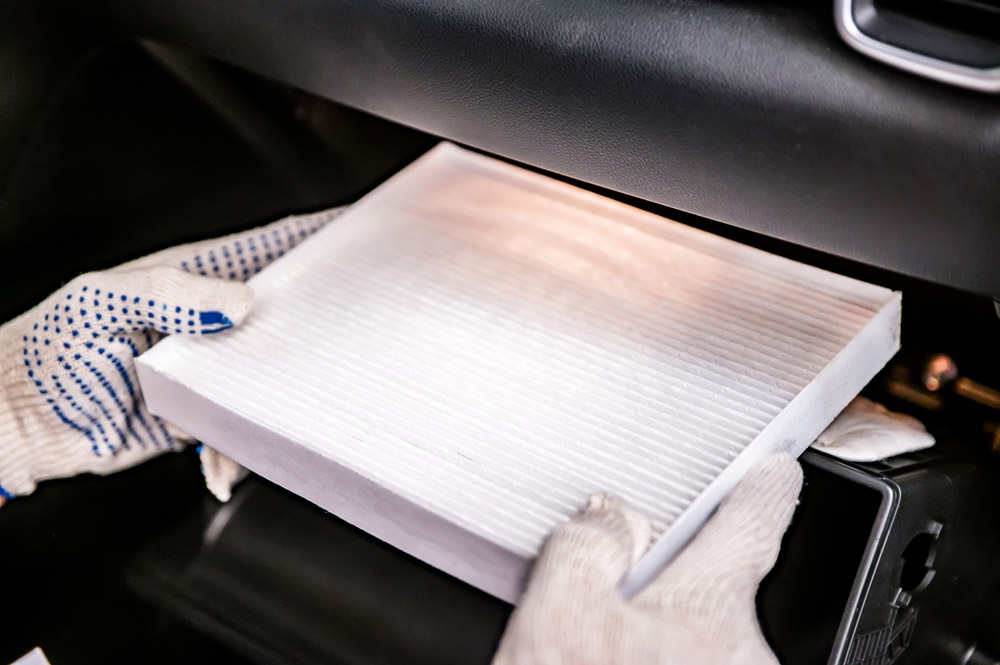
Let in the Good, Let Out the Bad
We’ve all been in the kitchen before, cooking some spaghetti. The noodles have been boiling for a while and are finally soft enough to eat and so you need to quickly get them out of the hot water. You can’t put your hand in there and take out the noodles one-by-one, nor is it practical to grab the serving spoon and ladle the noodles out of the pot, trying to drain the water after every dip. Instead, you do the smart thing and grab yourself a colander; that way, the noodles can be sifted from the water all at once, saving you a lot of time and energy, and ultimately doing a better job than you would have been able to do otherwise.
Your car’s filters are just like this, only instead of separating the dirt and waste because they’re the main ingredients for your vehicle’s operation, we want to make sure that they don’t end up being ground into any of the car’s delicate parts.
The Four Filters
Your vehicle utilizes four different types of filter in different places throughout. They are used to strain particulates from either air or fluids as needed. Let’s take a look at what they accomplish and how long they should work before you need to drop by our Provo car repair center and have them exchanged.
The Cabin Filter
This is the filter that ensures that the air coming into the driving compartment is clean. This cabin filter is separate from the car’s HVAC unit, so you can still benefit from using it without having to commit to being hot or cold. This filter strains things like:
- Dust
- Dirt
- Exhaust fumes
- Pollen
- Leaves
- Bugs
This filter should be replaced every 30,000 miles so that our Master Muffler technicians can ensure that you’re not breathing in anything you don’t want to be.
The Air Filter
Another filter meant to keep the air passing through the car clean. This differs from the cabin filter, however, because the air being cleaned by this particular filter is not meant to be breathed in by the driver, but it will rather be “breathed in” by the car; that is to say, the outside air that passes through the grill of the car will be cleaned before it mixes with the fuel vapors in the engine.
Because the air comes in through the grill, the filter typically pulls out:
- Bugs
- Water
- Rocks
- Pollen
If you are wondering whether it’s time to change out your air filter or not, our car repair technicians suggest swapping it out every 12,000 – 15,000 miles.
The Oil Filter
Thanks to the constant moving of many parts in the engine, the chance for damage caused by friction is high. Your motor oil is meant to help with this by keeping everything lubricated. Just like the air filter keeps particles from entering the engine’s interior, the oil filter keeps the oil on the engine safe from various harmful debris. The oil filter is meant to:
- Extend the life of the engine
- Improve the fuel efficiency
- Keep the oil in working condition longer
It is wise to have your oil and oil filter changed every 30,000 miles or so by one of our professional car repair service technicians in our Provo Master Muffler.
The Fuel Filter
So far, we’ve spoken about how these filters keep the integrity of the air and fluids pure so that the internal workings of the car can continue their jobs without being scored or otherwise damaged. This final filter is no different, though it does work in tandem with the air filter to ensure that the fuel that mixes with the air is likewise clean.
If you have any questions about whether or not your car is running optimally, please don’t hesitate to call us and set up an appointment for your car to be serviced by experienced professionals. We’re ready to help you.
Related Posts
Key Takeaways On average, passenger vehicle tires last 40,000 to 60,000 miles, depending on type, driving habits, and maintenance. Replace tires when tread depth reaches 2/32”, if damaged, or older than 10 years. Regular rotation, alignment, and proper inflation extend tire life. Aggressive driving, poor roads, and harsh weather shorten tire lifespan. Take advantage [...]
When you think about car maintenance, you probably focus on oil changes, tire rotations, and maybe even brake pad replacement. But what about your brake fluid? If you’ve ever wondered, “What does brake fluid do?” or “Why is brake fluid important?”, you’re not alone. Brake fluid might not be the most talked-about part of [...]
Is that high-pitched squeal from your brakes driving you—and everyone else—crazy? Don’t ignore it. Squeaky brakes aren’t just annoying, they’re your car’s way of saying something needs attention. Whether you're cruising through Salt Lake City or winding up Idaho’s mountain passes, here’s what’s likely going on, how you can fix it, and when it [...]





